Contemporary World Order A Vedic Perspective (Ancient Indian Literary Heritage-1)
Original price was: ₹1,500.00.₹1,050.00Current price is: ₹1,050.00.
1st Book of the Series Ancient Indian Literary Heritage, WAVES
| Editor | Shashi Tiwari |
| Edition | 2009 |
| ISBN | 9788177021400 |
| Pages | 287 |
| Binding | Hardbound |

About the Book
The present volume covers a wide spectrum of topics related to Vedic and Indian Studies especially in reference to the Contemporary World Order. Here only thirty one papers are published which were presented in the Seventh India International Conference of WAVES held at Pondicherry in December 2003. Conflict between different peoples, cultures and societies has been in existence since time immemorial. In this present scenario, India has a responsibility, as an emerging world power, to bring forward its ancient Vedic concepts for the benefit of suffering populations and for bettering the lives of future generations. Time, space and circumstances cannot decay or change truths revealed in the Vedas and ancient Indian scriptures. In this volume, papers are included on some important fields of study such as environment, management, safety, health, medicine, music, eroticism, philosophy, spirituality, psychology, ecology, comparative religion, world peace, and women’s rights. India, in some sense, presents through its tradition and literary heritage a different perspective of humanity and nature than what exists in the present dominant world view. We hope that our Endeavour of bringing this publication will be fruitful for the global academic community.
Preface
It gives me great pleasure and I feel proud to be a part of the first book published by WAVES (India) titled ‘Contemporary World Order: A Vedic Perspective.’ World Association for Vedic Studies (WAVES) is a multidisciplinary academic society with members from different religions, often of different scholarly views and varied interests. So it seems most fitting that its first book focuses on introducing Vedic principles as a new alternative way for dealing with the contemporary world orders particularly violent conflict. Conflict between different peoples, cultures and societies has been in existence since time immemorial. Genocides and protracted conflicts in numerous countries continue to take lives of innocent civilians. Many of these conflicts have arisen from differences in religion, race, political opinion, or other cultural beliefs. Problems like environmental destruction, starvation, diseases, and terrorism are also causing divisions among human beings. Perhaps the greatest impediment to the welfare of the next generation is ignorance or a lack of willingness to compromise and understand one another. In this present scenario, India has a responsibility, as an emerging world power, to bring forward its ancient Vedic concepts for the benefit of suffering populations and for bettering the lives of future generations. Time, space and circumstances can not decay truths revealed by Vedas. In this regard, Vedic concepts, describing unity of all religions, a pervasive God, sharing of resources- ‘ekam sad viprah bahudha vadanti,’ ‘Eavasyam idam sarvam yat kincit jagatyam jagat,’ ‘ten tyakten bhulijitha,’ ‘sarve bhavantu sukhinar and ‘Vasudhaiva Kutumbakam’ – are the only solutions to all problems. This entitles Vedic scholars and intelligentsia to shoulder more responsibility to lead in this present world order. At a time when every corner of the globe is affected by conflict and violence, there has never been a greater necessity for reflection on ways of achieving peace and harmony than now. Evidently, the issue of harmony, happiness and world peace is one that cannot be dealt with in a matter of days, or even years. However, while one voice may seem powerless, a collective voice can be a compelling force, which can ultimately result in substantial change. While many conflicts are incited due to religion, Vedic Dharma has, for the most part, remained a humble system of beliefs, quietly drawing more followers from across the world. Furthermore, an increasing number of people from all across the world are turning to India and its religions and cultural practices for enhancing their quality of life. As scholars of Vedic and Hindu studies, we have a responsibility to explore how our beliefs and practices can benefit the greater good. Through academic meetings and conferences we should come together to contemplate on possible solutions for resolving conflicts at global level to bring peace, happiness and harmony. I congratulate editors for this achievement and offer my best wishes for the success of this publication. I am confident that it will be an outstanding, academic and very useful publication. Foreword From a distance, sitting in Atlanta, I send my greetings and good wishes to you. It is for the first time in the last seven years, that I am not physically his present at the WAVES, India Conference. I was in India during May-July an 2003 and attended the WAVES, July 2003, conference in Kathmandu, Nepal. I have derived great strength and sense of purpose by attending these conferences. These conferences have brought together great souls and scholars together. Also, the first India Conference was inaugurated by Honourable former President of India, late Dr. Shankar Dayal Sharma, and ‘edi the tradition has continued. This conference is being inaugurated by Hon’ble AD), Shri Thiru N. Rangasamy, Chief Minister of Pondicherry. WAVES was formed after a major conference held in Atlanta (GA, ma, USA), October 4-6, 1996 with participants from all over the World-India, SA. Nepal, Carribean, Belgium, UK, Canada, Italy, Netherlands, Mauritius, Mexico, Austria and Surinam, etc. Paritcipants included leading archaeologists, historians, political-scientists, linguists, religionists, Sanskritists, Vedic-scholars, scientists, and persons from different professions. It is incorporated in the State of Louisiana and has exemption from federal income tax in USA. It reminds me to mention that Dr. Shashi Tiwari, a Sanskrit scholar of great dedication, attended the Atlanta Conference. She is one of the founder members of WAVES. Later she was elected as the secretary of WAVES India and is one of the first who started it then. India belongs to the world and so does its rich heritage. This needs to be understood by and shared with people world over. This is precisely the purpose of WAVES. A glance on the names of the members of the Governing Council of WAVES, USA will give you an idea of its reach in the wider world community. Its India Branch and several chapters have a great role in serving this purpose. Present dream of a man, sometimes, put as ‘American dream of a man’ is drastically different from the one presented by Indian seers that of ‘Amrtasya putrah’ . India, in some sense presents, through its tradition, a different prespective of humanity and Nature than what exists in the present dominant world view. However there is a strong connection. In Indian tradition the human past is Vedic-knowledge based, while presently all great human thinkers believe that this- Information Society-is the future of humanity. Therefore, when you deliberate on the ‘Vedic Perspective of World Order’, in this conference, I am sure you are discussing World’s future. Lastly, WAVES on the world stage has reached after four major stops, by holding its International Conferences-in 1996 in Atlanta, in 1998 in Los Angeles, in 2000 in New Jersey, and in 2002 in Massachusetts, to Washington, DC, the Capital of USA (virtually the present World Capital), in 2004, where it is scheduled to hold its Fifth International Conference, July 9-11, 2004. Most enthusiastically, I extend invitation to each of you to come to this conference, and be a part of ‘Intellectual Traditions of India’, a distinct matter on the time line of human advancements. May I end this message with my best wishes for the grand success of the conference? Of course I look forward to seeing you in Washington, DC, in the July, 2004 Conference.
Introduction
I have great pleasure in presenting this volume which constitutes the proceedings of the seventh India Conference of ‘World Association for Vedic Studies’ (WAVES), held at Mahatma Gandhi Dental College, Pondicherry, the pious land of Maharshi Aurobindo. The conference was organized in collaboration with the School of International Studies and Department of Political Science of Pondicherry University from 27th to 29th Dec. 2003. The response from the academic community was quite strong and presentations convered a wide spectrum of topics related to Vedic and Indian studies specially in reference to Contemporary World Order. In this volume only thirty one papers are selected for publication and abstracts of some important papers presented in the conference are also included for the reference. A Brief Report of the 7th India Conference of WAVES is given here to show the efforts that WAVES is putting up to focus attention on the Vedic and Indian literary heritage and its relevance to the present society. The inaugural session of the conference began with an invocation by Ms. Savitri of P.R.O. section. Prof. Kalyanaraman, President, WAVES, India Branch, welcoming the guests appreciated the efforts of Dr. Shashi Tiwari for controlling the entire hub of activities of India branch and Dr. N.K. Jha, Dean of the Institute of International Studies, Pondicherry University for successfully organizing the conference and bringing laurels to the Pondicherry Central University. Dr. Shashi Tiwari, Secretary WAVES, outlining the objectives and the activities of the India Branch informed that presently there are nearly, 127 life members, 50 annual members and six chapters at Banglore, Jodhpur, Gwalior, Shehdol, Meerut, and Lucknow. Dr. Shashi Tiwari read the message sent by the International President of WAVES, Prof. Bhu Dev Sharma who could not attend this conference due to his busy schedule at Atlanta. Prof. N.K. Jha introduced the theme of the conference i.e., Contemporary World order-a Vedic perspective and emphasized the need to uproot the roots of conflict by following the Vedic path. Thiru N. Rangasamy, Honourable Chief Minister of Pondicherry inaugurated the conference by lighting the lamp signifying the victory of light over darkness. He appreciated the efforts of WAVES in spreading the glory of the Vedas all over the world. He stated that the Vedas provided solution to all problems of mankind and their contents were more relevant now as the present day world was ripped through rancour, intolerance and mistrust. He emphasized that life should be oriented on the guidelines set out in the Vedas. Thiru M.D.R. Ramchandran, Honourable Speaker of the Legislative Assembly inaugurated the Pondicherry Chapter of India branch, WAVES and offered his blessings. He said that the Vedic principles were holding a key to tide over the critical times in one’s life. Peace and Ahimsa were the cardinal bases of the Vedas. Prof. A.K. Bhatnagar, the Vice-Chancellor of Pondicherry University in his presidential address assured to redesign the curriculum of Pondicherry University so as to include the study of Vedas in a scientific way. He also released the souvenir of the 7th India conference containing the abstracts of 95 papers. A vote of thanks was presented by Dr. Panch Ramalingam, lecturer, Academic Staff College, Pondicherry University. The comparing of this session was done by Dr. Prem Shekhar, Sr. Lecturer of Pondicherry University. The session ended with National Anthem. This conference focusing different subjects related to Ancient India Wisdom and their relevance in the present context was divided into nine academic sessions with parallel sections in which three were plenary sessions. The first plenary session was chaired by Prof. O.P. Pandey, member secretary, Mahareshi Sandeepni Veda Vidya Pratishthan, Ujjain, who informed about the various measures being undertaken by the Pratisthan to save the oral tradition of Vedic recitation. Dr. S. Kalyanaraman, President WAVES, India Branch, delivered his lecture on the Vedic Vratas- the importance of Rta and Rya. The session was followed by a sumptuous lunch at Sea Gulls Hotel where the participants enjoyed the beauty of the Sea along with, the delicious food hosted by Hon’ble Chief Minister Thiru N. Rangasamy. On the first day of the conference second session was divided into three sections, each chaired by Prof. Ram Gopal, Jodhpur, Prof. Alka Bakre, Mumbai, and Mrs. S.P. Goel, Delhi on the Vedic Studies, Gila and Upanishads and Epic and Dharma6astra respectively. Papers were presented by Dr. Ravindranath V. Ramdas from Mumbai, Prof. Gauri Mahulikar from Mumbai, Shri N.C. Beohar from Jabalpur, Ms Isha Gamloth from Srilanka, Ms Anuradha Chaudhary from Pondicherry, Dr. Sunanda S. Joshi from Mumbai, Dr. Rekha Shukla from Kanpur, Prof. Syamaladevi from Kerala, Shri Vaidyanath Prabhakar and Shri Krishna Kumar from Bangalore in these sessions and were discussed in length. Prof. Indira from U.S.A. chaired the third session after tea break. The theme of the session included Sanskrit studies and religious studies. Prof. Anand Nayak from Switzerland, Shri Prashant Bhardwaj from Shimla, Shri Gyanranjan Panda from Tirupati, Shri Vaidyanathan from Bangalore, Dr. Sundari Siddartha from Chennai, Shri Deepak Raajan and Shri D. Purushothaman from Pondicherry presented their papers. The proceedings were followed by dinner at Hotel Mass hosted by Prof. A.K. Bhatnagar, V.C., Pondicherry University. Next day the conference began with an invocation by Dr. Ram Sumer Yadav from Uttarakashi. The forth session was jointly chaired by Prof. C.L. Prabhakar from Bangalore and Shri Bhola Nath Yogi from Nepal. Some very excellent papers were presented in this session which included presentations through transparencies on Ambhovada by Dr. Ram Gopal from Jodhpur. Other presenters included Dr. Shashi Tiwari from Delhi, Dr. Panch Ramlingam from Pondicherry, Dr. K. Rajagopalan from Tirupati, Dr. T.S.N. Shastri from Pondicherry, Dr. Manmohan Acharya from Orissa, Dr. S. Padmapriya from Pondicherry, Dr. Ramsumer Yadav from Uttarakashi, Dr. Alka Pandey from Lucknow, Shri Shreyas Munshi from Mumbai, Dr. Vimla Devi from Gajipur and Dr. Ruchita Sumane from Mumbai who spoke on Vedic Sciences, Philosophical Studies and role of Yoga for Health today. The fifth session as the second plenary session was chaired by Dr. Shyam N. Shukla from U.S.A. in which three important papers were presented-‘The Vedas as Universal Religion’ by Swami Shri Ramananda ji from Nepal, ‘ Vrata in the Rigveda’ by Prof. Satyapal Narang from French Institute of Pondicherry and ‘Chhandgastra and Binary Numbers’ by Prof. T.R.N. Rao from USA. The Lunch at Hotel Jairam was hosted by Thiru M.D.R. Ramchandaran, Hon’ble Speaker of the Legislative Assembly. Sixth Session specially based on the themes of Ramayarta, Indian culture and Vedic sciences was divided into two sections-which were chaired by Prof. S.V. Narayanan and Prof. Madanmohan from Pondicherry. S. Ram Mohan from Chennai spoke on Maths and Prof. Indira Y. Junghare from USA on Marathi Goddess. Other speakers who presented their papers were Prof. Indira Bai from Kerala, Dr. Seethamalakshmi from Bangalore, Dr. D.B. Ghare from Bangalore, Dr. Alka Bakre from Mumbai, Dr. C.P.V. Vijaykumaran and Dr. Rishi Sagar from Kerala and Prof. Sushama Kulshreshtha from Delhi. Section A of the seventh session was again on the Vedic studies which was chaired by Prof. Gauri Mahulikar of the Dept. of Sanskrit, University of Mumbai. This included papers from Dr. N.K. Jha from Pondicherry, Prof. T. Thomas Varghese from Kerala, Dr. K. Dharnidharan from Pondicherry and Dr. Indulata from Bhubaneshvar. Section B of the seventh session was chaired by Prof. R.S. Tripathi from Sanskrit Vidyapeeth of Tirupati, at which papers were presented by Prof. Madanmohan, Shri M. Parameswaran, Dr. D. Sakthignanavel, and Murugesan from Pondicherry. The third day began with an invocation by Dr. Seethamalakshmi. A combined eighth session on Astrology and political and social studies in the Vedas was chaired by Prof. S.P. Narang. The reputed presenters included Mrs. S.P. Goel from Delhi, Prof. C.L. Prabhakar from Bangalore, Shri Jeffery Armstrong from Canada, Dr. Krishnamurthy from Pondicherry, Dr. Neelmani Upadhyay from Mandi, Shri Rakesh Pandey from Gwalior, Shri K. Manikandan from Chennai, Shri M.S. Krishnamurthy, Ms. Bharati and Sumitha from Pondicherry. The ninth session as third plenary was chaired by Prof. T.R.N. Rao from U.S.A. where International secretary of WAVES from USA, Professor Hope K. Fitz presented her paper on ‘Ahinisei : A Vedic Source for A Peaceful World Order’. The Valedictory session was graced by the noble presence of Thiru K. Lakshminarayanan, Honourable Minister for Education and Toursim of Pondicherry and Thiru Dr. R. Padmanabhan, Chief Secretary, Pondicherry Govt. In his address, Education Minister said that the lack of proper understanding of the Vedas and Upanisads had been the cause for the present day conflicts, contradictions and tension. The Chief Secretary of Pondicherry Govt. stated that Vedas and Upanisads were a repository of knowledge and wisdom. Karmakanda and Iffinalcatida are two main parts of the Vedas and central theme of the Vedas is to make mankind lead a more meaningful, purposeful and useful life. On this occasion Dr. Shyam N. Shukla and Prof. Hope K. Fitz form U.S.A. were present on the dais as guests of honour. In the closing function, Dr. Shashi Tiwari, Secretary of India Branch delivered welcome address, Dr. S. Kalyanraman, President of India Branch delivered the presidential address, and Prof. N.K. Jha, chairman of the local organizing committee proposed a vote of thanks. The conference concluded with the lunch hosted by Education Minister of Pondicherry in honour of the delegates of the 7th India Conference of WAVES. In fact, it has been a huge and wide canvas of subjects on which excellent pieces of paintings were painted by scholars not only from the fourteen states of India but also from five countries of the world, proving beyond doubt that WAVES has generated intellectual Waves which will certainly wash away the ugly propaganda that all knowledge came from the west and every Indian discovery dates after the birth of Chirst. WAVES is gradually spreading its message and the time is not far away when once again Bharata will attain its lost glory of a Jagatguru. At the time of publication of the proceedings of the Seventh India conference of WAVES I take this opportunity to thank all the authors of the papers, and the publisher for their contribution and cooperation. My special thanks are for Prof. Alka B. Bakre, Former R.G. Bhandarkar Professor and Head, Department of Sanskrit, Mumbai University, for helping me as the Sub-editor of this volume. Finally, we dedicate this first publication of WAVES named as ‘Ancient Indian Literary Heritage’ Series – I, ‘Contemporary World Order: A Vedic Perspective’ to all the members and friends of WAVES.
Only logged in customers who have purchased this product may leave a review.

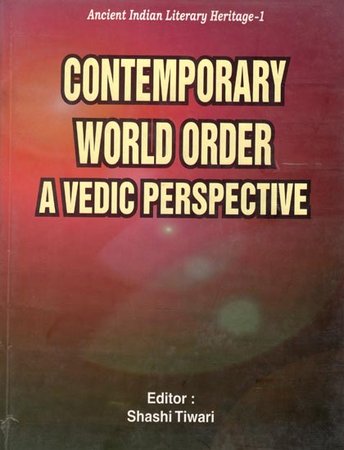
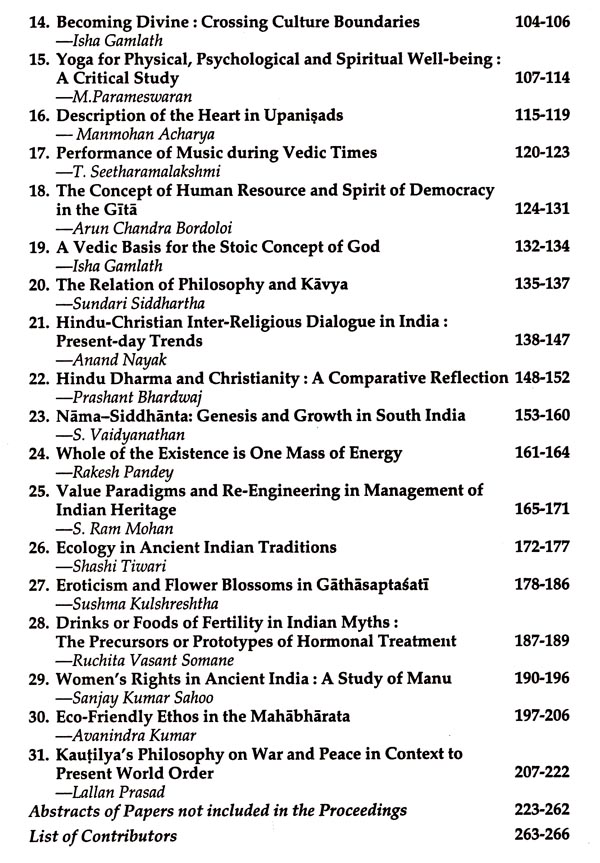
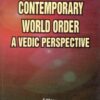
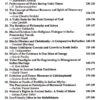

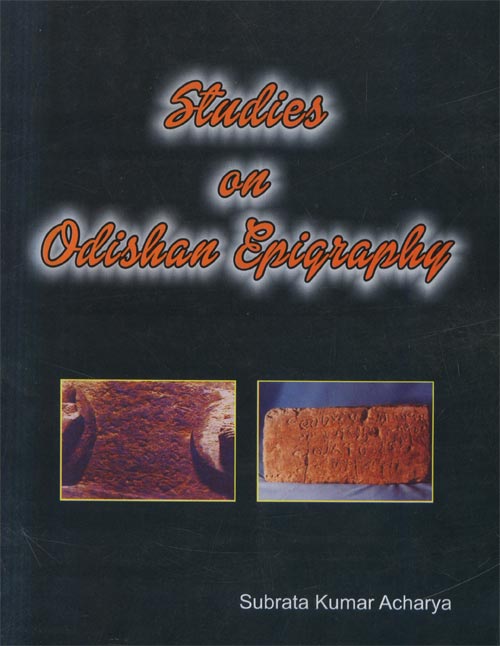

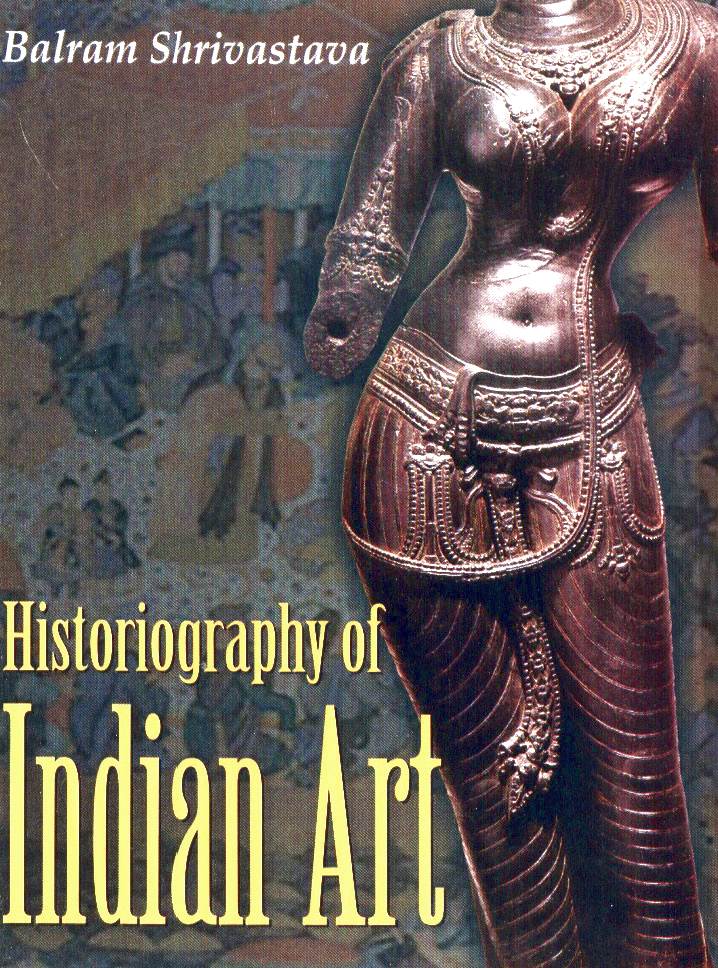




Reviews
There are no reviews yet.